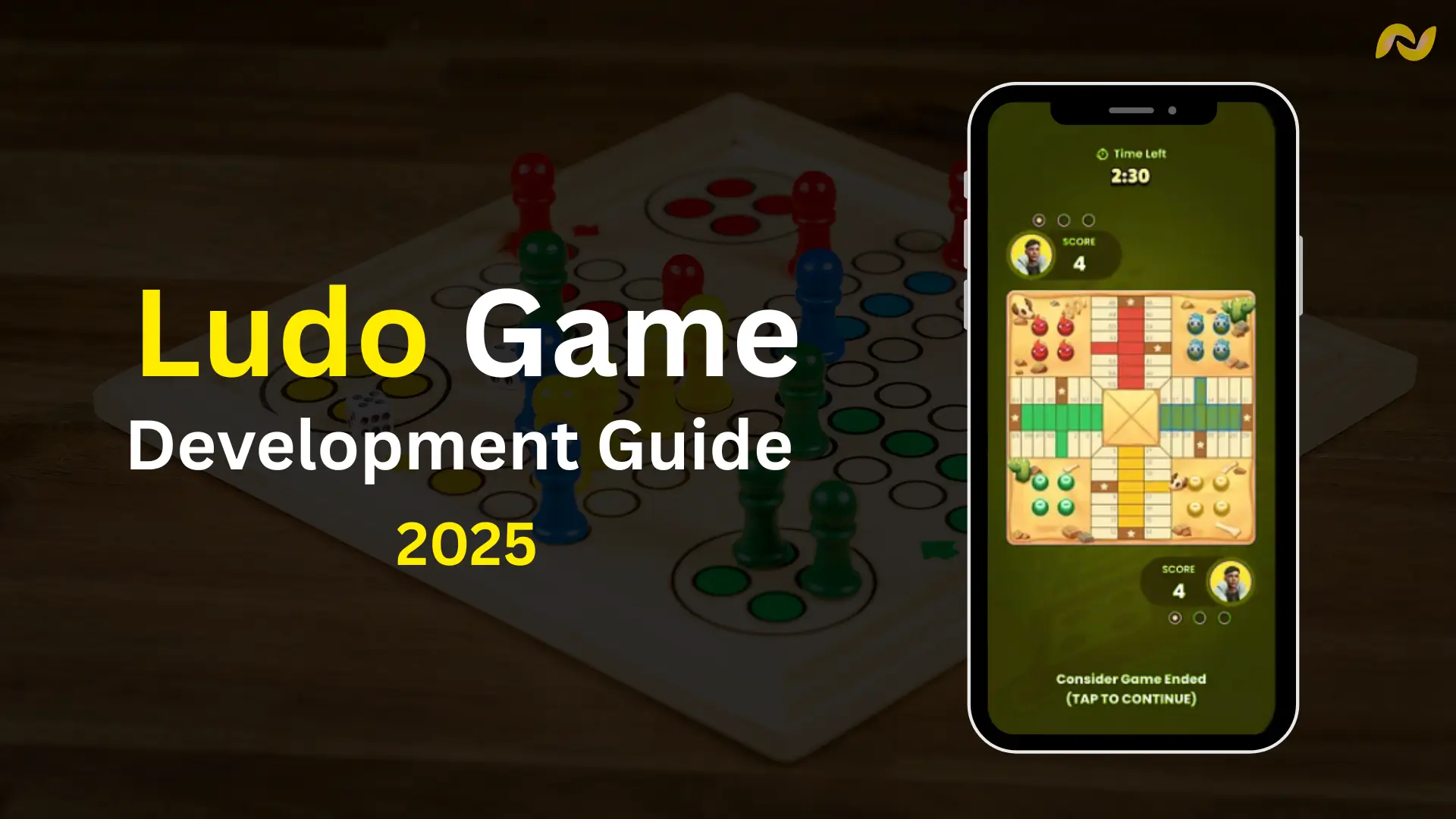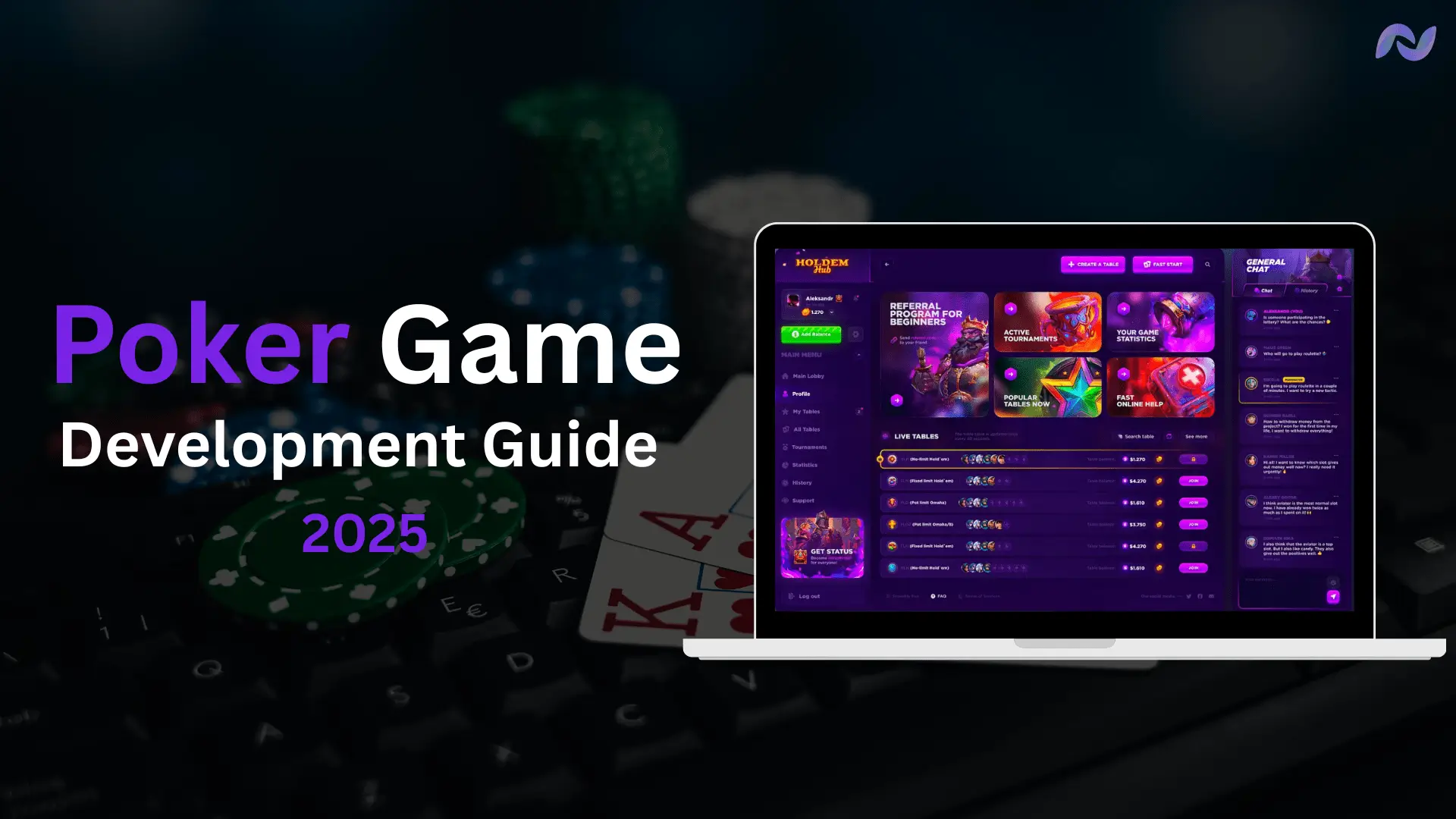A Complete Guide for Ludo Game Development (2025)
Ludo is a classic game that many people have played, whether with family or friends. With its mix of luck, strategy, and competition, Ludo has experienced a rise in popularity in the digital world. If you’re curious about how this fun, colorful board game transforms into engaging mobile apps or web games, you’re in the right spot. In this guide, we will go over the basics of Ludo game development. We’ll cover the features, design essentials, and technical details to help you understand how to recreate this classic game online.
Table of Contents
ToggleWhat is Ludo Game App Development?
Ludo app development is about creating a digital version of the classic Ludo game, which can be played on mobile devices. This process includes designing, coding, and building a version that allows players to enjoy Ludo anytime and anywhere. Ludo game app developers focus on smooth gameplay and bright graphics while adding features like multiplayer modes, chat options, and rewards. Their goal is to make the experience feel as real as possible, or even better. In simple terms, Ludo game development keeps the nostalgic fun of Ludo but updates it for modern use, letting players roll the dice and enjoy it on their phones or computers.
Various Ludo Game Variants You Must Know
[1] Indian Pachisi
Pachisi is an old Indian game, often seen as the inspiration for Ludo. Players use cowrie shells instead of dice on a cross-shaped board. It’s a game of strategy, patience, and luck. Families in India have enjoyed this game for centuries, playing together on mats as a social activity.
[2] British Uckers
Uckers is a British version of Ludo popular in the Royal Navy. It’s known for playful banter, house rules, and unexpected twists that make it more unpredictable. Sailors enjoy this game during their free time, adding their style to the rules. Uckers combines Ludo with humor and rivalry.
[3] German Brändi Dog
Brändi Dog is a team game from Germany that blends Ludo with card play. Instead of using dice, players move pieces around the board with playing cards. This game balances luck and strategy, making it a favorite for family gatherings. It encourages everyone to think ahead.
[4] North American Trouble
Many know Trouble for its pop-o-matic dice bubble. This North American version is simple, quick, and fun, especially for kids. The popping sound adds excitement whenever someone rolls. It offers simple Ludo gameplay with a playful twist.
[5] Chinese Airplane Chess
Airplane Chess comes from China and features colorful airplanes instead of pawns. Players race their planes to the finish line. Its bright design and fast-paced rules make it especially popular with kids. The game blends racing excitement with Ludo elements.
[6] Swiss Haste with a Wheel
This Swiss version includes a spinning wheel that decides your move. It replaces traditional dice-rolling, making each turn exciting. The wheel adds an element of surprise, so players cannot predict their next move. It’s fun, lighthearted, and keeps everyone engaged.
[7] Swedish Fire
Swedish Fire focuses on speed and quick thinking. Players make fast moves, creating a lively competition, unlike the slower pace of traditional Ludo. The game keeps tension high as players race against one another.
[8] Spanish Parchís
Parchís is Spain’s favorite game and is deeply tied to its culture. Its rules are similar to Ludo, but the board design and some twists make it unique. Families often gather to play, making it as common in Spain as Ludo is in India.
[9] Vietnamese Horse Race Game
Vietnam’s Horse Race game offers a fun twist on Ludo by using horses instead of pawns. Players race their horses around the board to reach the finish line. The game is simple and engaging, creating racing excitement for all ages. It feels more like a real race than just a board game.
[10] Colombian Parques
Parques is Colombia’s beloved version of Ludo, played at family gatherings and friendly get-togethers. While the rules are similar to the original, small changes make it unique to Colombian culture. The game brings laughter and rivalry.
Select From Various Ludo Game Software Development Approaches
[1] Custom Ludo Game Development
Custom Ludo game development allows you to create the game exactly how you want it. You can choose the design, features, rules, and themes to match your vision. This option is great if you want to stand out in the market with something unique. Although it may take more time and cost, the result is a special Ludo experience.
[2] Hybrid and Cross-Platform Development
Hybrid and cross-platform development enables you to build a Ludo game that runs smoothly on Android, iOS, and desktops. This saves time and reduces costs while making your game accessible to more players. Everyone can enjoy the same game experience, regardless of their device. This method is ideal if you want to reach a larger audience quickly.
[3] White Label Ludo Development
White label development gives you a readymade Ludo game that you can brand with your logo and designs. It is a fast way to launch your game without spending months in development. This option works well for businesses that want to enter the gaming market quickly. You get a professional product that feels truly unique to you without developing it from scratch.
[4] Turnkey Ludo Software Development
This approach provides a complete and ready-to-launch solution with all the features set up. It includes multiplayer modes and payment gateways in one package. You only need to make minor changes, and your game is ready to launch. This is a simple option for entrepreneurs looking to start their Ludo business quickly.
[5] Ludo Clone App Development
Ludo clone application development involves recreating popular versions of Ludo with similar gameplay and features. This is a smart way to enter the market by offering a familiar experience that players know and enjoy. You can add some unique elements to make it stand out. This option is often more affordable and faster than creating a brand-new game from scratch.
Factors and Challenges in Ludo Game Mobile App Development
[1] Setting the Game Rules Right
The first step in making a Ludo game is to ensure the rules are clear and accurate. Ludo may seem simple, but there are different rules based on regions or traditions. Some versions give an extra turn for rolling a six, while others do not. Developers need to choose which version to use, or allow multiple options, so players feel the game is fair and familiar.
[2] Designing a User-Friendly Interface
A confusing screen frustrates players. In Ludo, the board is the main focus, so the interface should be clean and easy to use. Developers must balance appealing visuals with simplicity. If players have trouble finding buttons or moving pieces, they may lose interest quickly.
[3] Ensuring Fair Gameplay
Fairness is a significant concern in online Ludo. Players often wonder if the dice rolls are fair. Developers need to create a transparent algorithm that works like real dice rolling. If players don’t trust the game’s fairness, they are likely to leave.
[4] Smooth Multiplayer Experience
Ludo is meant to be played with others, so good multiplayer features are essential. However, real-time multiplayer can suffer from lag, syncing problems, and dropped connections. Developers need reliable servers and effective coding to ensure all players see moves instantly.
[5] Engaging Visuals and Animations
Although the board game is simple, digital players expect lively animations and smooth movements. However, too many effects can slow the game down. Developers must find a balance between attractive visuals and fast performance.
[6] Easy Monetization
Most digital Ludo games are free to play, so developers must consider ads, in-app purchases, or premium versions. But if ads appear too often or purchases feel forced, players might uninstall the game. Balancing revenue generation with player satisfaction can be challenging.
[7] Cross-Platform Compatibility
Players use various devices like Android, iOS, tablets, and desktops. Developers need to ensure the game looks and works the same on all platforms. Testing for bugs on each type of device is essential for a smooth experience.
[8] Handling Security and Fair Play
Online games can attract hackers and cheaters. Developers must implement security measures to prevent unfair practices, such as auto-move bots or rigged dice rolls. If cheating is common, genuine players will quickly leave the game.
Include General Features and Functionalities in Ludo Games
[1] Multiplayer Support
Play Ludo with friends, family, or strangers online. Multiplayer support brings the fun of playing together, just like sitting on the floor with a board game.
[2] Quick Support
If you encounter a bug or payment issue, Quick Support helps you get assistance quickly. This way, your game can continue without interruptions.
[3] Classic Mode
Enjoy the classic mode, which keeps the game simple and true to its original style. It’s the same Ludo you remember.
[4] Practice Match
Use the practice mode to play against computer opponents. It’s a great way to learn without pressure.
[5] Auto Move
If you ever get distracted, the auto-move feature keeps the game going smoothly. No one has to wait for you.
[6] Real-time Gameplay
Experience the excitement of live play. Real-time gameplay makes every move engaging and competitive.
[7] Public Matchmaking
Public matchmaking helps you find random players around the world. You can always join a game.
[8] Turn Timer
A turn timer keeps the game moving quickly. It prevents unnecessary waiting and keeps everyone involved.
[9] Custom Board Themes
Personalize your game with custom themes. Change the board’s colors and styles to fit your mood.
[10] Power-ups
Try out special power-ups for a fun twist. They add surprise moves to the game and change up the usual flow.
[11] Anti-cheat System
A strong anti-cheat system keeps the game fair. It ensures that every victory is earned honestly.
[12] Spectator Mode
Friends can join in the fun by watching you play. Spectator mode allows them to cheer you on during the game.
[13] Voice Chat
Use voice chat to make your online game feel more personal. You can talk, laugh, and plan with friends while playing.
[14] Tournaments & Events
Join tournaments and events for a competitive challenge. They keep players engaged with rewards and rankings.
[15] Betting Mode
If you love excitement, try betting mode. You can stake virtual coins, adding more thrill to every match.
[16] Replay Feature
The replay feature allows you to watch past games, learn from mistakes, or relive your winning moments again.
[17] Daily Rewards
Receive daily rewards for logging in. You can earn coins, boosters, or bonuses to keep you motivated.
[18] Push Notifications
Get push notifications so you never miss a turn, event, or friend request. They help you stay connected even when you’re away.
[19] Tutorial Mode
New players can learn the rules easily with a simple tutorial mode. It explains everything step-by-step to avoid confusion.
[20] Game History
Track your progress with game history. You can see your wins and losses, which shows how much you’ve improved.
[21] Leaderboards
Leaderboards add a competitive twist. Check your ranking and compare scores to challenge yourself.
[22] Achievements
Unlock badges or trophies to celebrate milestones. Achievements motivate you to keep playing.
[23] Multi-language Support
Enjoy the game in your language. Multi-language support ensures that everyone can play.
[24] Custom Rule Sets
Families have their ways of playing Ludo. Custom rule sets let you change the rules to fit your traditions.
Advantages of Incorporating Advanced Technologies in Ludo Games
[1] Artificial Intelligence (AI)
AI makes playing Ludo online smarter and more fun. It helps create fair matches by balancing player skills and enhances computer opponents, making them more challenging to play against. AI also ensures smooth gameplay by predicting moves and avoiding glitches, giving players a better experience. Overall, it makes the game feel more interactive and engaging.
[2] Machine Learning (ML)
Machine Learning improves the game by learning from how players act. Over time, it understands your playing style and suggests better strategies. It can also match you with opponents at your skill level; this makes sure every game feels competitive and enjoyable, rather than one-sided. Additionally, it helps developers improve the game by identifying what players like or dislike.
[3] Cloud Computing
Cloud technology makes it easy to play Ludo with friends or strangers around the world. You don’t need a powerful device or a lot of storage; everything works smoothly on the cloud. You can also pick up a game on your phone, tablet, or laptop without losing your progress. Plus, cloud servers handle many players at the same time, so you can enjoy lag-free gaming, even during busy hours.
[4] Blockchain Technology
Blockchain adds trust to online Ludo games. It allows secure and clear transactions, so players can compete safely in games with rewards or tokens. It also helps prevent cheating by keeping a fair record of every move in a tamper-proof system. This builds confidence and creates new opportunities to earn within the game.
Follow a Standard Ludo Game Software Development Process

[1] Understand and Define the Idea
Start by clearly defining your game concept. Ludo has standard rules, but the app can be creative. Decide if you want a classic version similar to the physical game or a modern version with levels, rewards, and tournaments. This step involves the development team and stakeholders working together to finalize the vision, identify the target audience, choose platforms (iOS, Android, or web), and set overall goals. A clear idea gives the project direction from day one.
[2] Research the Market and Competitors
Once you have a clear idea, do thorough research. The gaming market has many Ludo apps, each offering different features. Analyze competitors to find their strengths and weaknesses. For example, some apps may have great interfaces but lack features like private rooms or multiplayer tournaments. Others might be popular but have poor reviews due to bugs or bad monetization. By analyzing market trends and player feedback, developers can create a product that stands out and avoids common issues.
[3] Plan the Features and Create a Roadmap
After research, plan carefully what features your Ludo game will have and how the project will progress. A Ludo app can be a simple offline game or a full-featured multiplayer platform with rewards and social elements. Decide on online and offline modes, private rooms for friends, and real-time chat options. Are leaderboards or cross-platform play important? Once you finalize the features, create a roadmap to outline milestones, development phases, and timelines. This roadmap keeps the team organized and on track.
[4] Design the UI/UX
Design is key to making the game enjoyable. The Ludo app should feel familiar yet modern. The board, dice, tokens, and interface should be similar to the traditional game while offering smooth navigation and appealing visuals. Designers work on layouts, colors, animations, and sound effects for a seamless experience. The game must be easy to use so players of all ages can enjoy it. Good design keeps players coming back.
[5] Develop the Core Functionality
This stage involves technical work. Ludo game developers write the game’s logic, ensuring randomness in dice rolls, correct token movements, and fair turn management. For multiplayer modes, they integrate networking features for smooth gameplay between players in different locations. Backend systems handle user data, leaderboards, and transactions if the app has in-app purchases. Scalability is crucial; the team must ensure the game can manage large numbers of players without performance issues.
[6] Rigorous Testing and Quality Assurance
After core development, the game undergoes detailed testing. This phase checks for bugs and ensures the gameplay is smooth, fair, and enjoyable across various devices and platforms. Testers examine every aspect of the game, including dice rolls, token movements, and multiplayer synchronization. Performance tests check how the game handles heavy usage, while compatibility tests ensure it works on different screen sizes and operating systems. Security checks are vital, especially for in-app purchases or user logins.
[7] Deployment and Maintenance
Once testing is complete, the game is ready for launch on app stores. However, the launch is just the beginning. Ongoing support and updates keep the game engaging. Developers monitor player feedback, release bug fixes, and introduce new features or seasonal themes. Regular updates, such as festive boards or new challenges, help retain players and attract new ones. Strong post-launch support ensures the game thrives over time.
Technology Stack to Develop Powerful Ludo Game Solutions
[1] Game Engine: Unity (C#), Unreal, Godot, Phaser.js, or Cocos2d-x
[2] Frontend Development
- Mobile: Flutter, React Native, Kotlin/Swift
- Web: React.js/Vue.js + HTML5 Canvas/WebGL
[3] Backend Development: Node.js (Socket.IO), Java (Spring Boot), Python (FastAPI/Django), Go, or C# (ASP.NET)
[4] Real-Time Communication: WebSockets, Photon Engine, Colyseus
[5] Database: PostgreSQL/MySQL (SQL), MongoDB/Redis (NoSQL)
[6] Cloud & Hosting: AWS / GCP / Azure / Firebase
[7] Design & Assets: Figma, Photoshop, Illustrator, Blender
[8] DevOps: GitHub/GitLab, Docker, Kubernetes, CI/CD pipelines
[9] Monetization: Play Store / App Store purchases, AdMob, Unity Ads, Stripe/Razorpay
[10] Analytics & Engagement: Firebase, Google Analytics, Mixpanel, OneSignal
Advantages of Incorporating Crypto and Blockchain in Ludo Games
Using crypto and blockchain in Ludo games makes them more exciting and changes how people play. First, blockchain keeps the game fair by recording every dice roll and move in a way that everyone can see. Players can trust that the game is based on skill and luck, not hidden tricks. Second, crypto rewards give players a fun chance to earn digital tokens or prizes that have real value outside the game. These tokens can be traded, saved, or used in other games and platforms, making the experience more rewarding. Another benefit is the simplicity of transactions. Crypto allows players from different countries to join without concerns about payment systems, bank delays, or extra fees. This turns Ludo into not just a casual game, but a global community where people can play, compete, and earn together. In short, blockchain and crypto transform a classic game into a modern, secure, and rewarding experience.
Crucial Factors that Affect the Ludo Game Development Cost in 2025
[1] Choice of Platform
The platform you select, Android, iOS, or both, affects your costs. Building for just one platform is usually cheaper. However, many businesses now choose cross-platform apps to reach more people. This can increase development costs but helps achieve better long-term results.
[2] Game Features and Complexity
A basic Ludo game with standard rules will cost less than a game with extra features like multiplayer options, chat, AI opponents, or in-game rewards. The more complex the features, the more time and effort developers will need, which increases the cost.
[3] Design and User Experience
Ludo players expect attractive designs, smooth animations, and interactive interfaces. Simple designs may lower costs, but you will need a bigger budget if you want striking graphics and a great user experience. Good design keeps players engaged.
[4] Technology and Tools Used
The technology, frameworks, and tools you choose for development affect the costs. For example, using advanced tech for real-time multiplayer or safe payment systems can increase expenses. Avoiding quality in this area may lead to performance issues later, so it is wise to invest carefully.
[5] Team Expertise and Location
Hiring developers from different areas can change your costs. Developers in countries like the US or UK typically charge more than those in Asia. Also, experienced teams with gaming app backgrounds may cost more, but they can provide quality and reliability that saves you money in the long run.
[6] Post-Launch Support and Maintenance
Development does not stop at launch. You need regular updates, bug fixes, server maintenance, and new features to keep players interested. These ongoing services add to the total cost, but they are essential for keeping your Ludo game competitive in the fast-paced gaming market.
How Next Olive Can Help You in Your Next Ludo Game Project?
If you want to launch your own Ludo game, having the right Ludo game development company is crucial. Next Olive is a reputed firm that has over 13 years of rich experience in Ludo game and app development, Poker Game Development, and Casino Game Development and has provided their Ludo game development services in more than 20 countries to turn their ideas into successful digital products. Their team includes more than 100 skilled developers who are always ready to face new challenges. Next Olive stands out because they communicate openly and transparently throughout the project. You will always know what is happening and can contribute to the process. They use an Agile method, which allows them to adapt quickly and keep the project progressing efficiently, helping avoid delays. They are committed to delivering on time, so you won’t have to deal with frustrating hold-ups. Most importantly, their client-focused approach ensures that your vision and goals guide the project. Whether it’s smooth gameplay, attractive design, or dependable backend development, Next Olive works hard to make sure your Ludo game is successful and enjoyable for players.
Conclusion
In conclusion, Ludo game development involves more than just coding. It’s about bringing back the fun and connection that people feel when playing together. Whether you are new to game development or have experience, you will learn patience, creativity, and problem-solving skills. You need to design the board and the dice mechanics, and ensure a smooth multiplayer experience. Every detail is important. The most rewarding part is seeing your game come alive and making players happy. If you have thought about making your own Ludo game, go for it; you’ll learn a lot and might inspire others to play, laugh, and connect through your game.
Frequently Asked Questions
What is the name of the most reliable Ludo game app development company in the USA?
Next Olive is the trusted Ludo app development company that specializes in Ludo game making. It has more than 13 years of experience in developing solutions for the online gaming industry in over 20 different countries, such as the USA, UK, Malaysia, UAE, South Africa, etc, and more than 100 Ludo app developers.
What is the general Ludo app development cost to create an app like Ludo King?
The cost of developing an app like Ludo King varies greatly due to several contributing factors, such as platform, complexity, and type. Usually, it starts with $10,000 and goes over $100,000.
How much time does it usually take to develop a Ludo game?
Ludo games can be simple and highly complex, and the time for developing them varies accordingly. Generally, it takes from 2 months to over 10 months to develop a basic to advanced Ludo game with various features and functionalities.
How many different types of Ludo game variants are there?
There are many different variants of Ludo, such as Indian Pachisi, British Uckers, German Brändi Dog, North American Trouble, Spanish Parchis, and more.
What technologies are used to develop Ludo games?
Popular technologies include Unity, Unreal Engine, and Cocos2d for game engines; Node.js, Socket.IO, or Photon for real-time multiplayer; and Firebase or AWS for backend services.
Do you add AI opponents to your Ludo game?
Yes, we add realistic AI opponents that can simulate human-like opponents when no real players are available. Difficulty levels can be adjusted to enhance the user experience.






